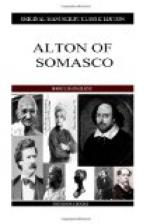Okanagan laughed a little almost silent laugh that had no mirth in it. “If the boys can head him off from the railroad I’ll find him sure,” he said. “Oh, yes, I think I know him. When we get him I’m figuring we’ll find the marks of Harry’s knife on him.”
Okanagan found the trail again lower down the valley, and he and another tireless man headed for the river through a country no horse could traverse all that day, leaving Seaforth behind them worn-out at noon. He sat down to wait for Horton considerably disturbed in mind, and his anxieties would not have been diminished had he known that Alton was starting for Somasco by the Atlantic express that afternoon.
It was next day when Alton reached the settlement and found the few women there in a state of excitement, while when he had heard their story he borrowed the best horse he could find and rode out at a gallop towards the ranges. He had also spent several days in the bush without finding any trace of the party when he camped one evening on the edge of one of the many deep ravines the torrents wear out of the hillsides. It stretched, a dim shadowy chasm, across his path, and looking down he could faintly see the firs that clung here and there to the sides of it loom faintly black through the drifting mist. It was too dark to seek for a way of descending or round the head of it, and he decided to remain where he was until the morning. Twenty minutes sufficed to make his simple camp, and he sat with his back to a cedar-trunk and a can of green tea beside him, while the shadows crept higher up the hillsides and night tame down to meet them out of the dimness of the east.
The fire crackled joyously. There was hope in all the smells of spring, and the stir of life in every growing thing, while the chill that came down from the white peaks fired the blood like wine; but Alton sighed as he glanced up at the stars above him and his face was sombre. There was, it seemed, no possibility of the railroad being built to Somasco, he could only see disaster in front of him, and knew that with the hope of prosperity a brighter one had gone. He would be a poor man, and was a cripple, and—for he had not forgotten his deficiencies—could have laughed at the folly which had led him to grasp at that which could never be his. Then his slow, enduring stubbornness came to his help again as he remembered that there yet remained to him the fight with Hallam.
“I was a fool. She only wanted to be kind,” he said.
Still, he groaned in a fit of passion as the memory of one moment at midnight in Somasco ranch returned to him, for all his pulses throbbed feverishly as he felt in fancy the warm white arm steal round his neck.
“I must have dreamt it—with the rest,” he said. “And if I didn’t, that was enough to remember. God bless her for her gentleness.”
Again he flung the memories from him with an effort that brought a dew to his face, but the conflict which must be fought every day was over, and he stretched his long limbs amidst the soft cedar-twigs and lay down to sleep with a stolid acquiescence that if wholly free from bitterness was but little brightened by the victory. The man’s life had been a struggle almost since its beginning, and he was stubborn, but his own headstrong passions had been the most obdurate enemy he had ever brought into subjection.




